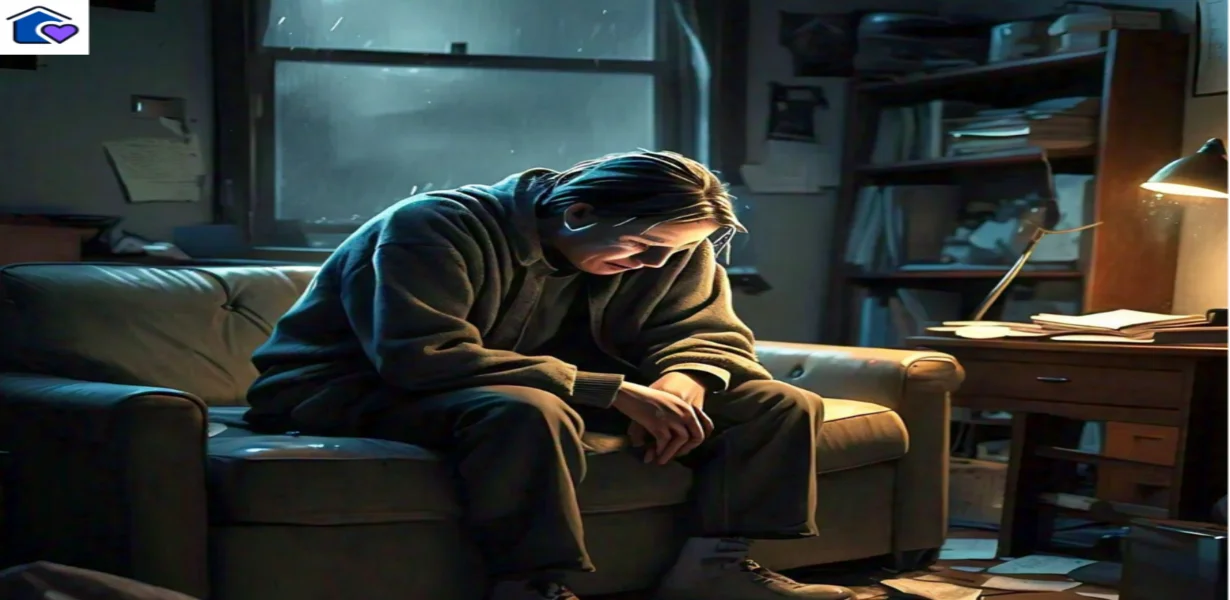Why Do I Have of Feeling Dead Inside?
Many individuals use the phrase “I am feeling dead inside” to characterize a profound feeling of emotional numbness or emptiness. This sensation can be upsetting and perplexing, leaving you to wonder why you’re feeling this way and how to get rid of it. This post will discuss the typical origins of this feeling, its psychological effects, and doable strategies to help you deal with and get past it.
What Does It Mean of Feeling Dead Inside?
People frequently describe a deep emotional numbness or detachment from their feelings when they say that ‘I am feeling dead inside’. This feeling can be described as follows:
- Emotional Deficit: You may feel incapable of feeling happiness, sorrow, or any other kind of emotion.
- Disconnection: A feeling of alienation from people, things, or your environment.
- Loss of Interest: Things and pursuits that you formerly found meaningful or important may suddenly seem pointless or unimportant.
While acknowledging the source of these emotions can be unsettling, doing so is the first step in finding solutions.
Common Causes of Feeling Dead Inside
-
Mental Health Conditions of Feeling Dead Inside
1.1. Depression
One of the most frequent reasons for experiencing emotional numbness is depression. Depression symptoms can include weariness, a constant sense of sadness, and a lack of interest in once-jolly pursuits. Depression’s emotional numbness might cause you to feel cut off from your own emotions and you started feeling dead inside.
1.2. Anxiety Disorders
Emotional detachment can sometimes be a result of anxiety. An ongoing state of fear and anxiety can overpower your emotional system and cause you to feel disconnected or numb and also cause you to feeling dead inside.
1.3. PTSD, or post-traumatic stress disorder
Trauma can result in post-traumatic stress disorder (PTSD), which can cause emotional numbness. In order to shield itself from more suffering, the brain may shut down emotions as a coping mechanism for trauma.
-
Long-lasting Stress Cause You Feeling Dead Inside
2.1. Excessive Accountabilities
Emotional burnout can result from ongoing stress in one’s personal, professional, or academic life. Being under chronic stress can impair your capacity to perceive and understand emotions.
2.2. Insufficient Self-Care
Emotional numbness can arise when you disregard your own needs and well-being as a result of extreme stress. Your emotional resilience may be damaged if you don’t take regular breaks and practice good stress management.
-
Traumatic Experiences Can Cause of Feeling Dead Inside
3.1. Bereavement or Sadness
Feelings of emptiness and numbness can arise after suffering a major loss, like the breakup or death of a loved one. A numb, disoriented state where feelings appear far away or unreachable might be a symptom of grief.
3.2. Neglect or Abuse
Neglect or maltreatment throughout childhood can have long-term emotional effects, such as making one feel lifeless. Your capacity to understand and communicate emotions may be impacted by these experiences.
-
Existential Issues when You Are Feeling Dead Inside
4.1. Lack of Purpose
It is possible for the feeling that your life has no value or purpose to worsen emotional numbness. If you find it difficult to set direction or goals for your life, you could feel empty.
4.2. An Identity Crisis
Teenagers and young adults frequently have identity crises, which make them question their identity and place in the world. These existential questions may cause feelings of emotional alienation.
The Effects of Feeling Dead Inside on Psychology

-
Effect on Self-Regard
Emotional numbness can have a detrimental effect on your self-worth. You can begin to doubt your value or think there’s a serious issue with you.
-
Emotional Well-Being
Emotional numbness might result in additional mental health problems including worry or despair. An ongoing cycle of distress and loneliness may result from an incapacity to process emotions.
-
Interactions
Relationships can suffer when one feels dead inside. It can be difficult to connect with people when one is emotionally disconnected, which can result in miscommunication and distancing.
How to Deal with and Get Rid of That Feeling Dead Inside
-
Seek Professional Help when You Are Feeling Dead Inside
1.1. Counseling
A mental health specialist can offer helpful assistance. You can investigate the root causes of your emotional numbness and create coping mechanisms with the assistance of therapy. The following therapeutic modalities could be advantageous:
- The goal of cognitive behavioral therapy, or CBT, is to alter unfavorable thought and behavior patterns.
- Psychodynamic therapy: Examines repressed emotions and ideas connected to the past.
1.2. Medication
Medication may occasionally be recommended to treat underlying mental health issues including anxiety or depression. Speak with a medical professional to find out if taking medication is right for you.
-
Engage in Self-Care when You Are Feeling Dead Inside
2.1. Make wellbeing a priority
Mental well-being is contingent upon self-care. This includes: • Getting Enough Sleep: To assist control your mood and energy levels, aim for 7-9 hours of sleep each night.
- Maintaining a Balanced Diet: To enhance general wellbeing, incorporate a range of nutrients.
2.2. Apply Relaxation Methods
You can rediscover your emotional connection by using relaxation techniques. Think about:
- Deep Breathing Exercises: To relax your body and mind, practice deep breathing.
- Mindfulness and Meditation: To become more aware of and connected to your current emotions, engage in mindfulness exercises.
-
Rebuild Connections to Cure Your Feeling Dead Inside
3.1. Make Contact with Helpful Individuals
Reaching out to loved ones, friends, or support groups can offer psychological assistance and reduce feelings of loneliness. Tell those you trust about how you’re feeling and accept their support.
3.2. Assemble Support Teams
Support groups offer a forum for networking with like-minded others who comprehend the struggles you face. This can provide you fresh insights on dealing with emotional numbness and make you feel less alone.
-
Engage in Activities You Enjoy
4.1. Discover New Passions
Reestablishing a connection with past interests or pastimes can aid in reviving your emotional involvement. Taking part in things you enjoy, like reading, hiking, or drawing, can improve your mood.
4.2. Experiment
Reestablishing emotional connection might also be facilitated by taking up new hobbies or pastimes. Attempting anything new can provide novel experiences and assist you in identifying your joys.
-
Set Realistic Goals to Cure of Feeling Dead Inside
5.1. Divide Up the Work
To increase your sense of purpose and accomplishment, set small, attainable goals. Greater activities can feel less onerous if they are broken down into smaller, more manageable pieces.
5.2. Honor accomplishments
No matter how tiny, acknowledge and applaud your progress. Acknowledging your successes can improve your motivation and sense of self.
-
Challenge Negative Thoughts
6.1. Recognize Adverse Thought Patterns
Pay attention to any unfavorable ideas that fuel a sense of emptiness. Know when you’re thinking in a despairing or self-critical manner.
6.2. Change the Way You Think
Change your negative thoughts to more realistic or upbeat ones. Try changing your thoughts from, “I’m worthless,” for instance, to, “I’m doing my best, and that’s enough.”
-
Create a Routine

7.1. Create Everyday Routines
Establishing a regular schedule can offer stability and organization. Incorporate wellness-promoting pursuits including physical activity, self-care, and social connections.
7.2. Allocate Time for Relaxation
Include downtime and leisure activities in your daily schedule. You can learn to handle stress and re-establish emotional connections by making time for relaxation.
-
Engage in Physical Activity
7.1. Create Everyday Routines
Establishing a regular schedule can offer stability and organization. Incorporate wellness-promoting pursuits including physical activity, self-care, and social connections.
7.2. Allocate Time for Relaxation
Include downtime and leisure activities in your daily schedule. You can learn to handle stress and re-establish emotional connections by making time for relaxation.
-
Explore Creative Outlets
9.1. Express yourself through Art
Painting, writing, or other creative endeavors are excellent ways to express and work through your feelings. You can explore and express your feelings through creativity.
9.2 Dance and Music
Dancing or listening to music can improve your mood and help you re-establish emotional connections. Music can be a therapeutic release and has a strong emotional expressive effect.
-
While Feeling Dead Inside Exercise Self-Compassion
10.1. Show Yourself Some Love
Be nice and understanding to yourself. Understand that it might be difficult to feel like you’re dead within, and that it’s acceptable to ask for assistance and need time to recover.
10.2 Do Not Judge Yourself
Do not criticize yourself if you feel emotionally numb. Recognize that these emotions are fleeting and that you can overcome them with effort and assistance.
When to Get Help Right Away while Feeling Dead Inside
You should get help right away if you’re having trouble managing your emotions and feel overburdened. Symptoms that indicate you need to get help right away include:
- Persistent Thoughts of Self-Harm: Contact emergency services or seek immediate assistance from a mental health professional if you are experiencing thoughts of harming yourself or others.
- Severe Depression or Anxiety: See a doctor or therapist if you have extreme depression or anxiety due to a sense of being lifeless inside.
- Difficulty Functioning in Daily Life: You may need expert assistance if you’re finding it difficult to carry out everyday duties or to maintain minimal self-care.
Conclusion
Feeling dead inside is a difficult and complicated experience, but you can find relief by being aware of its causes and acting proactively. You may endeavor to reestablish friendships, explore creative outlets, get expert assistance, practice self-care, and reestablish a connection with your emotions in order to enhance your general wellbeing. Recall that it’s critical to practice self-compassion and to ask for help when you need it. You may get past these emotions and reclaim your sense of life and purpose with time and effort.

There are additional articles to read.
There are some more articles based on different topics regarding family members and other home organizing issues; if you want to read them, then visit actual home guide, and for more information about your self-care, you can visit Invest Ideas.
Relevant Post:
- Time Saving Cleaning Tips: Revealing 10 Steps to Clean up Your Tidy Home
- Importance of Money: 6 Best Ways to Teach Every Age Kid About Money
- Retirement Planning: 5 Impressive points to calculate your needs accurately.
- Water Preservation: 6 Effective Strategies and Solutions for a Maintainable Future
- Conflicts with your Spouse: Exclusive 8 ways to resolve Conflicts Between Husband and Wife that Never Fails
- Types of Behaviour: An Exclusive Overview on 10 Behaviours Types
You May Like:
- 151 Bold Cycling Team Names For Your Events in 2024
- 120 Best Police Team Names That Will Arrest Your Attention
- 120 Robotics Team Names: Stand Out in Every Contest
- Best Golf Team Names for 2024 | Funny & Creative also
- 186 Scavenger Hunt Team Names Perfect for Explorers
- 197 Best Kan Jam Team Names; Funny, Clever, & Pop Culture
- Smash the Game: 175 Cool Ping Pong Team Names
- 125 Game-changing Bocce Ball Team Names for 2024
- 162 Best Flag Football Team Names in 2024
- Best 147 Euchre Team Names for an Epic Night
- 207 Best Volleyball Team Names That Are A Hit in 2024
- 273 Badminton Team Names: Smash Your Way to Victory!
- Top 276 Game-Changing Tennis Team Names for 2024
- Inspiring Cell Group Names: Ideas to Unite in 2024
- 209 Best Softball Team Names Trending in 2024
- 6 Shocking Reasons Why CrossFit Ruined My Life?
- 12 Labors CrossFit Columbia in Columbia MD A Comprehensive Guide
- Water Preservation: 6 Effective Strategies and Solutions for a Maintainable Future
- Do CrossFit Athletes Take Steroids? Best Guide 2024
- How Much Does It Cost to Start a CrossFit Gym?
- How can family members effectively solve problems together?
- Common Family Problems and How to Solve Them
- A Complete And Impressive Guide on CrossFit 10 General Physical Skills
